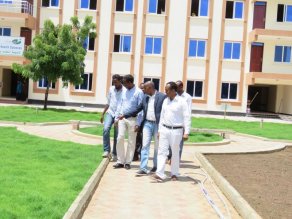
Young Somalis at the University of Simad, Mogadishu. Wikimedia Commons
The Somali conflict has affected Somali citizens inside and outside the Somali region for over 25 years. While Somaliland and Puntland have enjoyed relative stability for more than two decades, conditions are much more fragile in south-central Somalia, and residents in many parts of the Somali region face considerable levels of insecurity still. In late 2012, however, the first permanent central government since the start of the civil war was installed in Mogadishu. This increased expectations that south-central Somalia is transitioning towards greater stability and created hope amongst the Somali diaspora. Since 2011-2012, the number of people returning to south-central Somalia has increased considerably.
It is widely acknowledged that the Somali diaspora plays a central role in political-economic affairs while having socio-cultural impact inside the Somali region. Remittance inflows reach over 1.2 billion USD annually. Similarly, their political role is great and has been shown both to increase and mitigate conflict potential. While much of this political-economic influence plays out transnationally, from places like Minneapolis, London and Oslo, it is increasingly crucial also to look at the impact of return. I do not refer to ‘return’ in the sense of a final stop in a migration trajectory from a place of departure in the country of origin to a place of arrival in the country of destination and back. Rather, the reality of many Somalis outside Somalia involves continued engagements in, and experiences from, more than one national context.
For many young Somalis, a multi-sited embeddedness exists; created in the interactions between feelings of belonging and practices of citizenship. Return to Somalia – whether periodical, short-term or long-term – allows young Somalis to compare contexts and this comparison may lead to contestations about Somalia’s future. Seeing Somalia through a Norwegian or American lens, many young members of the Somali diaspora wish to contribute to transformations in Somalia’s political and social structures. At the same time, through their return they aim to reshape their own future to one where they feel they can make a ‘real contribution’ to society – albeit not the society they grew up in but the society their parents moved from. These developments represent a number of opportunities for Somalia’s future, which are important to explore. But they also denote significant challenges if questions on who has the right to belong to and participate in society are not addressed.
- Read the full paper at the Horn of Africa Bulletin.